Q&A: ‘Hearts Beat Loud’s’ Kiersey Clemons and Sasha Lane can’t be boxed in

Actress Kiersey Clemons and director Brett Haley talk about diversity and inclusion in “Hearts Beat Loud.” They dropped by the L.A. Times Studio with castmates Nick Offerman, Ted Danson, Sasha Lane and Blythe Danner. FULL COVERAGE: Sundance Film Fe
- Share via
Kiersey Clemons remembers the moment she discovered who Sasha Lane was. It was late 2016 and she was walking the New York streets on her way to Whole Foods. In passing a movie theater, she stopped in her tracks, mesmerized by a poster outside. It was of a brown girl with dreadlocks, her hands thrown into the air. She faintly recalls some American flag-like colors on it.
“I was like, ‘Who the ... is that? She looks like me. I have to go see that,’” she said.
Clemons went directly into the theater to watch “American Honey,” Lane’s acting debut about a teenager who joins a band of misfits as they trek across the Midwest, partying hard, bending the law and falling in love.
“I was on the edge of my seat watching this movie,” she said, “and my heart was pounding because it was [someone like] me [on screen]. I emailed a guy at [the distribution company] A24, ‘This is the best movie y’all have ever made.’”
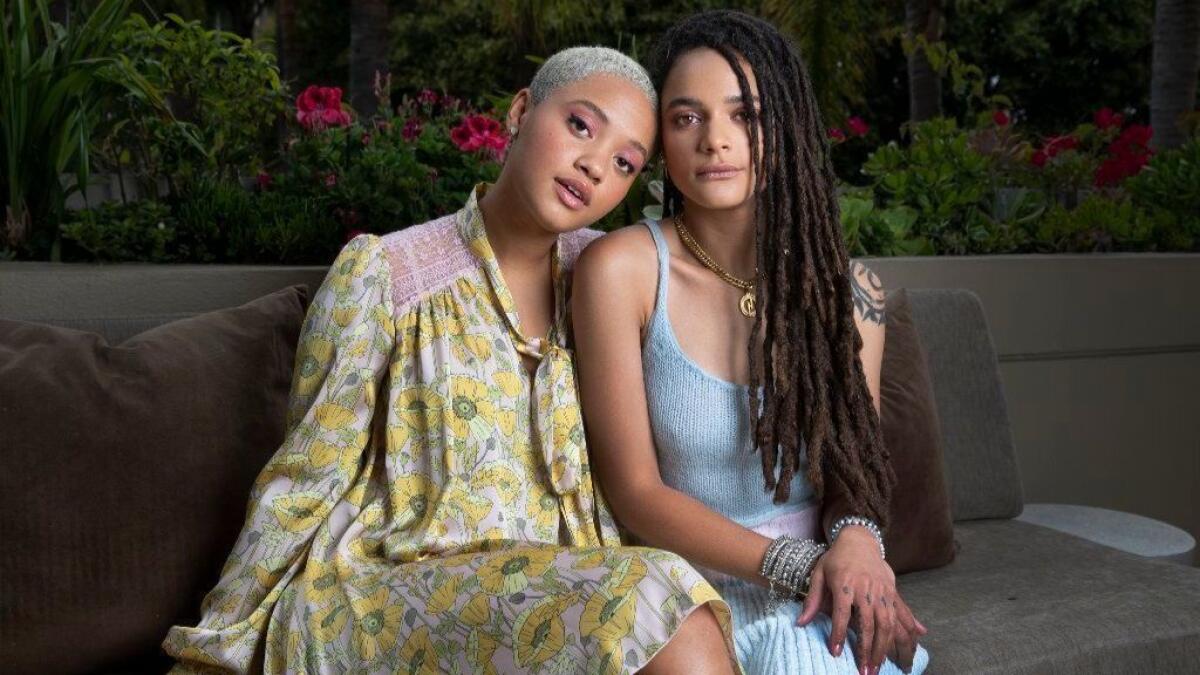
That’s one of the many moments when she realized “representation does [freaking] matter.”
Clemons and Lane would meet in person a couple months later and develop an enduring friendship with much in common: They’re both biracial queer women early in their careers interested in doing work that means something to them and others — work that matters.
It’s that purpose that made their collaboration on Brett Haley’s “Hearts Beat Loud,” now playing in limited release, all the more worth it. In it, Clemons plays Sam, a young Brooklyn native who forms a band with her dad (Nick Offerman) the summer before she goes off to college. Lane is Sam’s girlfriend Rose.
In advance of the film’s release, The Times spoke with the pair about working with Haley and co-writer Marc Basch to make their characters more authentic, an industry that tries to force them into boxes and the importance (and burden) of representation.
What made you say “yes” to this project?
Clemons: I was excited to make the movie because I’d be excited to see it. I really enjoy music and singing, and I enjoy musicals. I don’t even know if this is a type of musical … [if] you don’t like them, then it's not a musical. [laughs] But everyone else was already attached when I came on so I was excited to work with the cast, specifically Sasha because she texted me about it. I knew I wanted to do it before I even read it.
Lane: I just read the script and smiled. It was such a warm script and then after meeting with Brett, the fact that he was full-on allowing me to be part of the process of casting Sam and working on [dialogue], I thought it'd be a warm movie.
Were your characters written as biracial black girls?
Lane: Mine was, or rather [Brett] had already attached me so Rose was who I was. Sam was originally supposed to be Asian American, but after a while he wanted [the chemistry] to be right and feel good. We listened to people's songs and I played with those other [actors] but none of them felt right. Once we mentioned Kiersey, it felt right and the story was still doing what it was supposed to. It's not like we’re here to throw race in — it’s not mentioned, so it doesn’t really matter. It’s just the person who embodied the character, and Kiersey did that.
Did they want someone who could sing?
Clemons: There are a lot of actors who can sing and singers who can act but I know for so long I've always done both. And they wanted the vocals to be live so I think doing musical theater helped with that and being trained vocally probably had something to do with it.
Lane: And not just that … I heard these other girls sing the songs. It was beautiful. They had very nice voices, but hearing her sing -- I had nothing to do with it but [Brett] just sent me the track -- I cried. That’s what you want. She wasn’t just singing. She has something in her spirit... Being able to sing was great, but we needed something else. That’s not just technique. It’s energy.
Take me as I am in that moment because that’s my truth.
— Sasha Lane
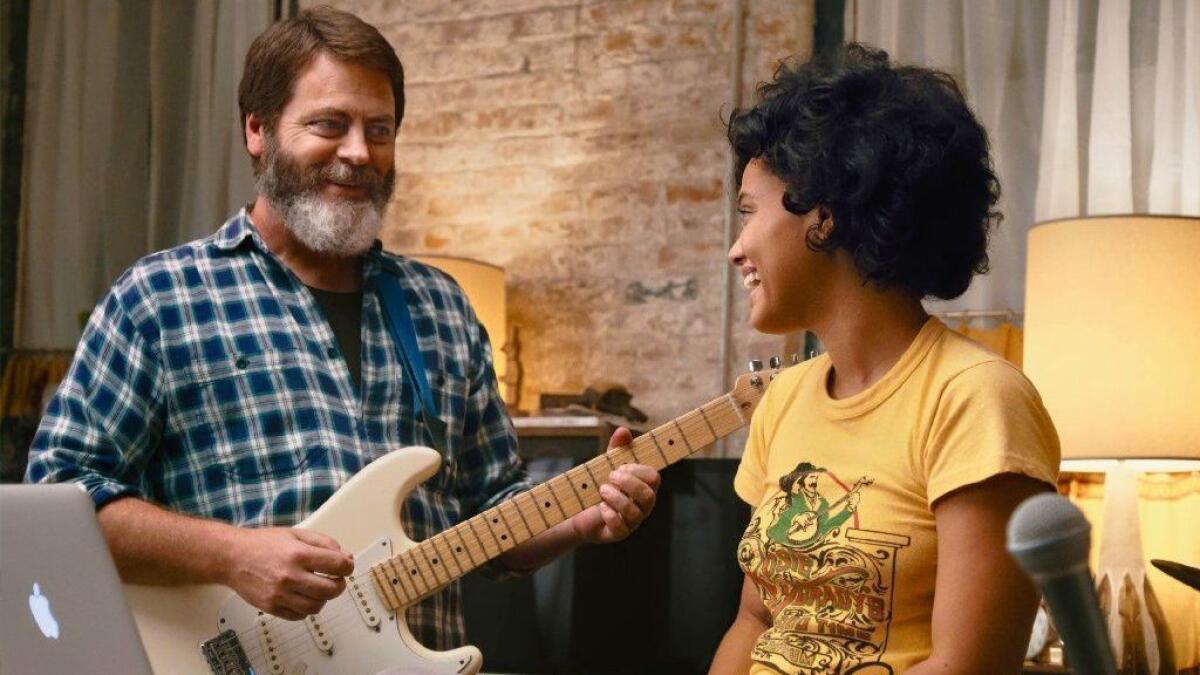
And you both worked with Haley and Basch on the script, right?
Lane: I really enjoyed that we got to sit there and go through it and have fun.
Clemons: I’ve told a lot of queer stories and I’ve had directors and writers that have worked with me [on the character]. But this was the first time I felt fully confident in what I was saying. It helped that [Sasha] was there.
Lane: Really, and since then, it’s built my confidence. Now when I read a script, I’m like, “I dig it, but it sounds like it was written by a male or someone that doesn't have a connection to this world.”
I find the film to be so beautiful and the relationship between your characters so authentic. I love that you both are brown queer girls in brown queer roles. Considering you have played both queer and not on screen, when you’re looking for roles what are you looking for?
Lane: I just want to find if I relate. Can I tap into this character? Do I feel like I have the right to play this, to embody this? There’s room for flexibility because we’re actors, but I want to make sure it feels right to me. It has to connect.
Clemons: I’ve never restricted myself in terms of playing straight or queer. On a personal level, I feel like I discovered myself and came to terms with myself while I was growing up and making movies. So, it’s interesting to do work that makes you think about yourself.
Like, I never thought about what my mom and I looked like together -- me being brown and my mom being white. I’m sure as a kid I did, but I’m 24 now and don’t ever think about that. And then you see yourself on screen or you read stuff and you're trying to get in character and you’re like, “Oh … this is what I look like to other people.”
At Sundance you were dubbed “the two queer women we need more of in Hollywood” amid this conversation about representation. When was the first time you felt like you saw yourself on screen?
Lane: Is it really [freaking] sad that maybe “Hearts Beat Loud” was the first time that I actually saw myself? I can choose other things that I’ve done but I don't know anything else that I connected with me on every single level.
Clemons: If I’m being honest, I remember having really strong feelings about “That’s So Raven.” As a kid, I moved around so much and there were times when I’d be the only person who wasn’t white in a classroom. I remember always being so afraid of, when I was 8, responding or acting in a way that was different from what everyone else was doing.
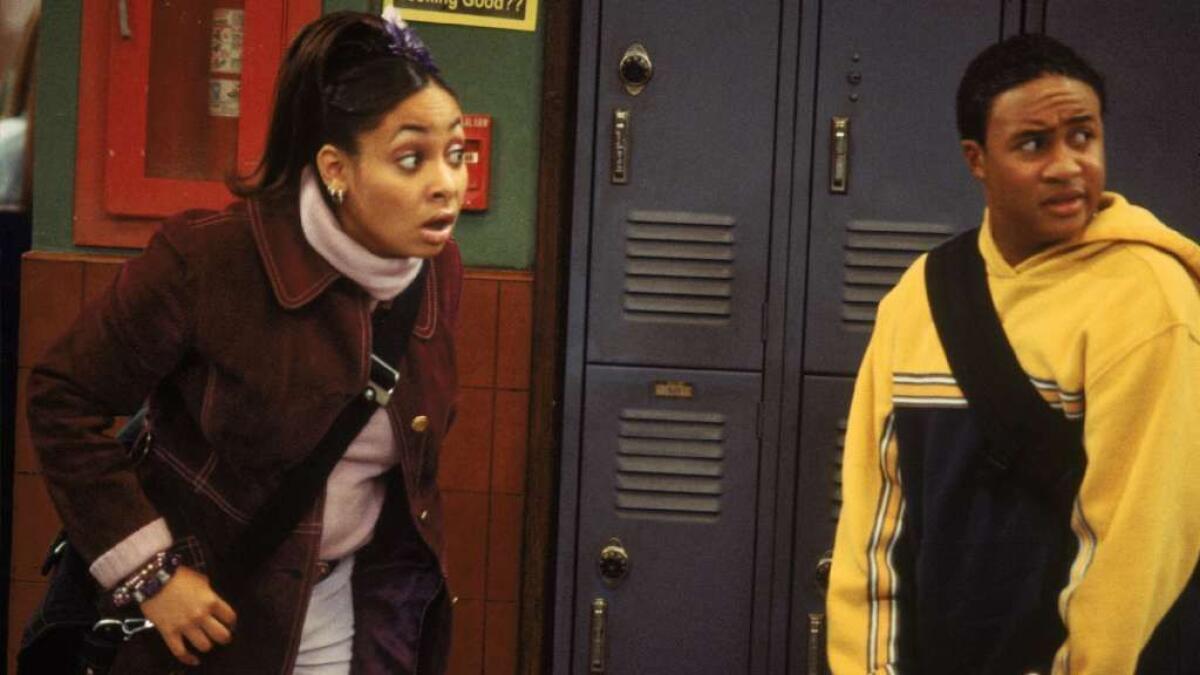
Lane: [Nodding] Or even with your hair being curly and everyone else’s being straight ...
Clemons: Yes, and afraid of anyone commenting on anything. If you were “sassy,” you got mocked. But that attitude that Raven-Symoné has that you inherently have if you have black aunties, sisters ...
Lane: Yeah! Like being goofy and loud ...
Clemons: It’s just how you talk to your cousins or the people in your household. It’s just different and it's part of black culture for some people in America. I remember seeing that on TV. Because before Raven-Symoné, I idolized Amanda Bynes. She was so funny and gross and said crazy [stuff]; she wasn’t Lizzie McGuire. And then we had Raven and I was like “She’s like Amanda Bynes but looks like me.” I didn't even know that was allowed to happen. Before seeing her, I was so restricted in what I thought a girl can be. Until you see it in a way that’s more relatable …
Lane: Like, “I can be like this too?”
Clemons: … I don’t have to limit myself. And as much as I want to be like, “[Screw] being a role model…” I have to remind myself that representation is a thing and it does matter. As much as you want to write off the royal wedding ... she's changing the way young girls see fairy tales.
How is it being somebody else's Raven-Symoné and somebody else’s Sasha?
Clemons: I still find it shocking. Because we get comments and immediate feedback on social media. I’m always [surprised].
Lane: It’s amazing. I love being an inspiration. That’s cool that you can get that out of me but I also need you to accept and understand and realize that I too am a person going through [stuff]. So, it’s not always going to be set in stone and it's not going to stay perfect, your image of me. I full on accept that I’m taking this responsibility and know I’m going to be an image for certain people because I’m trying to help people through my art. But acknowledge that I’m still going through it too.
Clemons: And also you realize that I’m not for everyone and that’s fine.
Lane: You don’t have to love me in order for me to feel OK ...
Clemons: Because people will all of a sudden start to say “Sasha or Kiersey is doing this and I’m not with it.” Well, I was never here for you. Go find someone else. There is a plethora of young, amazing brown women you can idolize. I’m just not the one for you and that’s fine.
Lane: Like, “We’re not on the same page and that’s cool.” I’m going to uplift her and she’s going to uplift me, because everyone has their own purpose. We can all support each other. You go be that, and she can go be that, but let me be this!
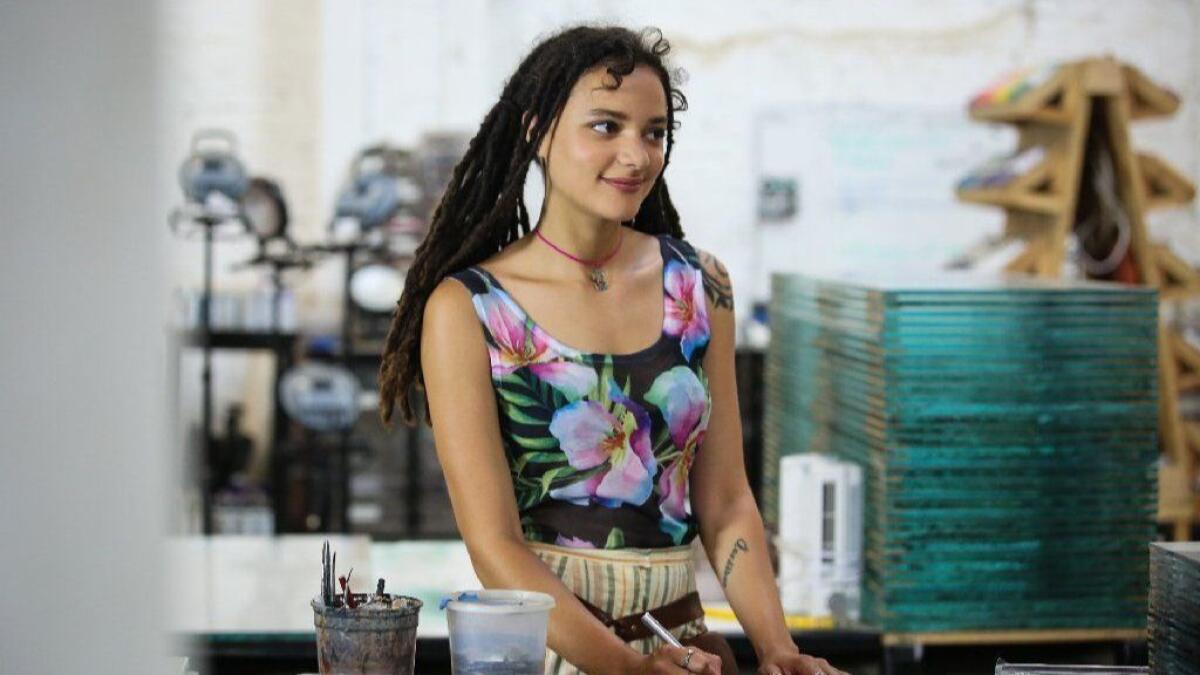
Lena Waithe often talks about the burden of representation and the fact that everything she does shouldn’t have to check everybody's boxes.
Lane: Because it might check that person's box over there and not yours and I can’t check everyone's box. Because then you lose yourself. That's why you've gotta be like, “I know I made this movie and I know how I felt when I made it, so whatever happens with this movie happens.” It will connect with the people it’s supposed to.
So how is it having these unboxable personas in an industry built on boxing people in?
Lane: It’s hard… It’s like a beautiful curse but I have to make sure that I’m not letting that bull ... take over.
Clemons: And everyone thinks they know what we want. They think we all want the same things: the cover, the movie, the award. But you don’t know what I’m chasing. You don’t know what aspirations I have outside of this. People always assume that they know your master plan.
Lane: And they say you have to be this or that but I can still be about peace and love and flow and energy, but also like to turn [it] up every once in a while…
Clemons: Can I say something? And this is a realization I’ve had in the last six months that completely shifted the weight of things... I used to feel so unbalanced, so down or so up. And I realized it was because I was trying to separate everything. No matter the film, you're like “this is my work life” and “this is my personal life.” But in this industry, you get to the point where you realize you can’t do that with everything.
I had been manipulating everything to make sense. I was so afraid of not making sense -- even though I hadn't been making sense to people for so long. In constantly doing interviews or even trying on clothes, we’re always forced to face ourselves and look at ourselves — physically, mentally, emotionally. You would think I was crazy if I broke down in tears right now because we’re always supposed to leave our truths [outside].
I took a step back and realized that, for black girls specifically, it’s always this thing of you can be outspoken and badass and stick-it-to-the-man and I’m a rebel or you can say everything people want to hear that’s rebellious enough but still [be] the American black princess. There’s no in between — which is where I feel like Sasha and I lie. And it's difficult and it’s hard because you’re expected to pick a side.
And you know that when you do an interview, they're going to pick a side for you if you don’t. And depending on that side they pick for you, they sell it to a certain type of person and you're sitting here having been pitched as a person that [you’re] not…
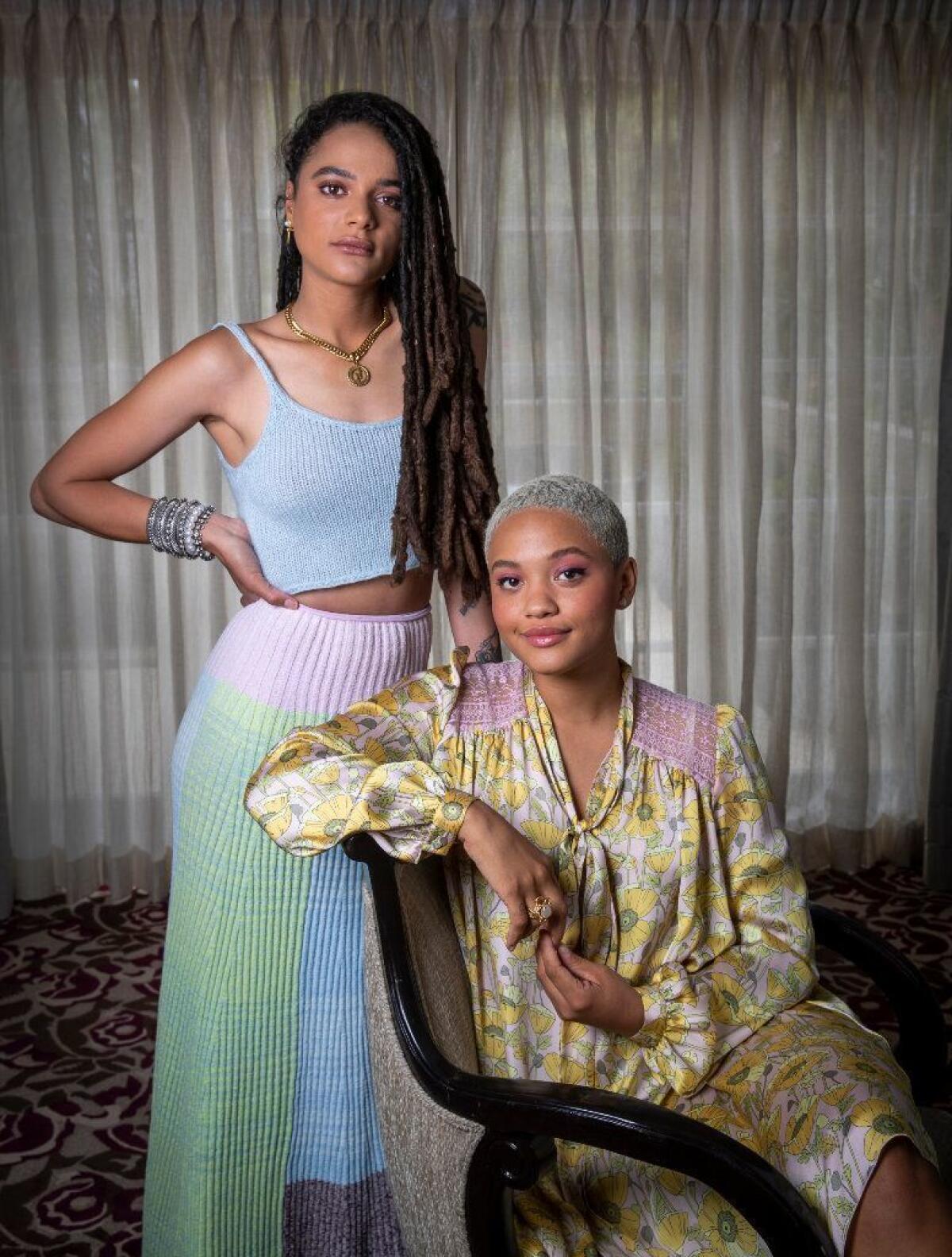
Lane: It’s like they’ve said “Sasha is purple” but I’m feeling like a [freaking] rainbow. Why can’t I be a queen and a tornado at the same time?
Clemons: Everything needs balance — and we have to allow balance. In Hollywood, as we’re pushing open all these doors, we have to expect balance. You don’t have to accept me, but don’t be mad when you see I’m a rounded out person. At the end of the day, what you should expect is sincerity. Because if you ask for a game, they’re going to give you a game.
I feel that deeply because, with me, people have expectations.
Clemons: “You don’t look like you work at the L.A. Times” [laughs]
Exactly, because there’s a particular idea of what a journalist is supposed to look like and what one at the L.A. Times is supposed to look like — and they're not supposed to be black, queer and gender nonconforming.
Lane: We don’t just let people be. The amount of photo shoots where I’m not happy that day and they want me to smile... I’m like, “I just broke down so this is what you’re going to get.” And other times I feel light and am dancing around and they're like “We want that badass Sasha.” But I’m not rebellious today. [laughs] Take me as I am in that moment because that’s my truth.
Clemons: It’s funny you have that issue because I always have the issue where they want me to be less feminine. It’s the haircut and the gay thing, but those that know me on a personal level know that I’m preppy and weird and super femme, the complete opposite of whatever picture you’ve painted of me. And all you’re doing trying to take this photo is paint another picture to add to the hall of fame and she ain’t even here. [laughs]
Lane: She ain’t even here!
Only good movies
Get the Indie Focus newsletter, Mark Olsen's weekly guide to the world of cinema.
You may occasionally receive promotional content from the Los Angeles Times.







